| Listing 1 - 10 of 44 | << page >> |
Sort by
|
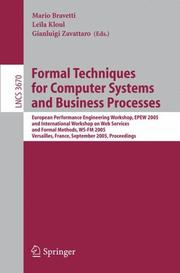
ISBN: 3540287019 9783540287018 Year: 2005 Publisher: Berlin: Springer,
Abstract | Keywords | Export | Availability | Bookmark
 Loading...
Loading...Choose an application
- Reference Manager
- EndNote
- RefWorks (Direct export to RefWorks)
Book
ISBN: 9782746205864 2746205866 Year: 2002 Publisher: Paris : Hermes Lavoisier,
Abstract | Keywords | Export | Availability | Bookmark
 Loading...
Loading...Choose an application
- Reference Manager
- EndNote
- RefWorks (Direct export to RefWorks)
Logique mathématique. --- Informatique --- Programmation logique. --- Méthodes formelles (informatique) --- Architecture des ordinateurs. --- Mathématiques.
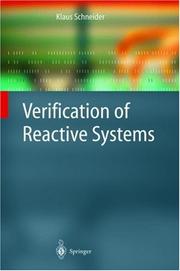
ISBN: 3540002960 9783540002963 Year: 2004 Publisher: Berlin ; New York : Springer-Verlag,
Abstract | Keywords | Export | Availability | Bookmark
 Loading...
Loading...Choose an application
- Reference Manager
- EndNote
- RefWorks (Direct export to RefWorks)
Reactive systems are becoming more and more important for essentially all areas of technical and professional activities as well as for many areas of everyday life. The design of these systems is a great challenge and requires sound compromises between safety and time-to-market. To meet these needs, early design phases nowadays include verification of given specifications against system descriptions to find potential design errors as early as possible. This book is devoted to the foundation of the most popular formal methods for the specification and verification of reactive systems. In particular, the µ-calculus, omega-automata, and temporal logics are covered in full detail; their relationship and state-of-the-art verification procedures based on these formal approaches are presented. Furthermore, the advantages and disadvantages of the formalisms from particular points of view are analyzed. Most results are given with detailed proofs, so that the presentation is almost self-contained. This book is targeted to advanced students, lecturers and researchers in the area of formal methods.
Computer science --- Computer systems --- Formal methods (Computer science) --- Computer algorithms. --- Systèmes informatiques --- Méthodes formelles (Informatique) --- Algorithmes --- Verification. --- Vérification --- Computer algorithms --- Verification --- Formal methods (Computer science). --- Systèmes informatiques --- Méthodes formelles (Informatique) --- Vérification --- Computer systems - Verification
Book
ISBN: 9783642152979 9783642152962 Year: 2010 Publisher: Berlin ; New York : Springer,
Abstract | Keywords | Export | Availability | Bookmark
 Loading...
Loading...Choose an application
- Reference Manager
- EndNote
- RefWorks (Direct export to RefWorks)
This volume contains the papers that were presented at the 8th International Conference on Formal Modeling and Analysis of Timed Systems (FORMATS 2010), held September 8-10, 2010, at IST (Institute of Science and Technology) Austria, in Klosterneuburg, Austria. The modeling andanalysis oftiming aspects of systems is a keyproblem that has been treated independently in several di?erent communities in computer science and related areas. Researchers interested in semantics, veri?cation, re- timescheduling,andperformanceanalysisstudymodelssuchastimedautomata and timed Petri nets, the digital design community focuses on propagation and switching delays, and designers of embedded controllers need to take into - count the time requiredby controllersto compute their responses after sampling the environment. Although the timing-related questions in these separate c- munities have their own speci?c nature, there is a growing awareness that there are basic problems that are common to all of them. In particular, all of these disciplines model and analyze systems whose behavior depends on combinations of logical and timing constraints between occurrences of events. The aim of FORMATS is to promote the study of fundamental and practical aspects of timed systems, and to bring together researchers from di?erent d- ciplines that share an interest in the modeling and analysis of timed systems. Typical topics include (but are not limited to): - Foundations and Semantics: theoretical foundations of timed systems and languages; comparison between di?erent models (timed automata, timed Petri nets, hybrid automata, timed process algebra,max-plus algebra, pr- abilistic models).
Computer simulation --- Temporal automata --- Formal methods (Computer science) --- Machine theory --- Simulation par ordinateur --- Automates temporels --- Méthodes formelles (Informatique) --- Automates mathématiques, Théorie des --- Congresses. --- Congrès --- Méthodes formelles (Informatique) --- Automates mathématiques, Théorie des --- Congrès --- EPUB-LIV-FT LIVINFOR SPRINGER-B
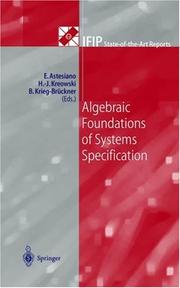
ISBN: 3540637729 3642641512 364259851X 9783540637721 Year: 1999 Publisher: New York : Springer,
Abstract | Keywords | Export | Availability | Bookmark
 Loading...
Loading...Choose an application
- Reference Manager
- EndNote
- RefWorks (Direct export to RefWorks)
The aim of software engineering is the provision and investigation of methods for the development of software systems of high quality with correctness as a key issue. A system is called correct if it does what one wants, if it meets the requirements. To achieve and to guarantee correct systems, the need of formal methods with rigorous semantics and the possibility of verification is widely accepted. Algebraic specification is a software engineering approach of this perspective. When Liskov and Zilles, Guttag and the ADJ-group with Goguen, Thatch er, Wagner and Wright introduced the basic ideas of algebraic specification in the mid seventies in the U. S. A. and Canada, they initiated a very successful and still flourishing new area. In the late seventies, algebraic specification became a major research topic also in many European countries. Originally, the algebraic framework was intended for the mathematical foundation of ab stract data types and the formal development of first-order applicative pro grams. Meanwhile, the range of applications has been extended to the precise specification of complete software systems, the uniform definition of syntax and semantics of programming languages, and to the stepwise development of correct systems from the requirement definitions to the running programs. The activities in the last 25 years have led to an abundance of concepts, methods, approaches, theories, languages and tools, which are mathemati cally founded in universal algebra, category theory and logic.
Software engineering. --- Formal methods (Computer science) --- System design. --- Génie logiciel --- Méthodes formelles (Informatique) --- Systèmes, Conception de --- Software engineering --- System design --- Formal methods (Computer science). --- Génie logiciel --- Méthodes formelles (Informatique) --- Systèmes, Conception de --- Computer programming. --- Computer logic. --- Computer science—Mathematics. --- Programming Techniques. --- Software Engineering. --- Logics and Meanings of Programs. --- Mathematics of Computing. --- Computer science logic --- Logic, Symbolic and mathematical --- Computer software engineering --- Engineering --- Computers --- Electronic computer programming --- Electronic data processing --- Electronic digital computers --- Programming (Electronic computers) --- Coding theory --- Programming
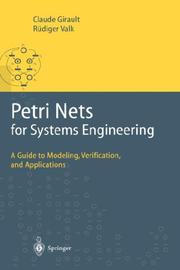
Abstract | Keywords | Export | Availability | Bookmark
 Loading...
Loading...Choose an application
- Reference Manager
- EndNote
- RefWorks (Direct export to RefWorks)
Programming --- Formal methods (Computer science) --- Systems engineering --- Petri nets --- Méthodes formelles (Informatique) --- Ingénierie des systèmes --- Réseaux de Pétri --- 681.3*D2 --- 681.3*F --- Software engineering: protection mechanisms; standards--See also {681.3*K63}; {681.3*K51} --- Theory of computation --- 681.3*F Theory of computation --- 681.3*D2 Software engineering: protection mechanisms; standards--See also {681.3*K63}; {681.3*K51} --- Méthodes formelles (Informatique) --- Ingénierie des systèmes --- Réseaux de Pétri --- Engineering systems --- System engineering --- Engineering --- Industrial engineering --- System analysis --- Graph theory --- Nets (Mathematics) --- System design --- Design and construction
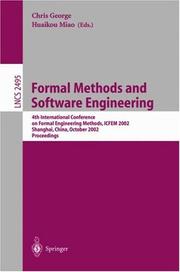
ISSN: 03029743 ISBN: 3540000291 3540361030 9783540000297 Year: 2002 Volume: 2495 Publisher: Berlin, Heidelberg : Springer Berlin Heidelberg : Imprint: Springer,
Abstract | Keywords | Export | Availability | Bookmark
 Loading...
Loading...Choose an application
- Reference Manager
- EndNote
- RefWorks (Direct export to RefWorks)
Formal methods (Computer science) --- Software engineering --- Méthodes formelles (Informatique) --- Génie logiciel --- Congresses --- Congrès --- Computer Science --- Engineering & Applied Sciences --- Méthodes formelles (Informatique) --- Génie logiciel --- Congrès --- Computer science. --- Software engineering. --- Programming languages (Electronic computers). --- Computer logic. --- Computer Science. --- Software Engineering/Programming and Operating Systems. --- Software Engineering. --- Programming Languages, Compilers, Interpreters. --- Logics and Meanings of Programs. --- Logic design. --- Design, Logic --- Design of logic systems --- Digital electronics --- Electronic circuit design --- Logic circuits --- Machine theory --- Switching theory --- Informatics --- Science --- Computer software engineering --- Engineering --- Computer science logic --- Logic, Symbolic and mathematical --- Computer languages --- Computer program languages --- Computer programming languages --- Machine language --- Electronic data processing --- Languages, Artificial --- Formal methods (Computer science) - Congresses --- Software engineering - Congresses
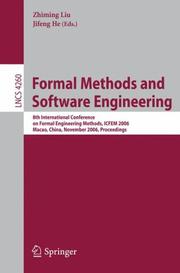
ISSN: 03029743 ISBN: 9783540474609 3540474609 3540474625 Year: 2006 Volume: 4260 Publisher: Berlin ; New York : Springer,
Abstract | Keywords | Export | Availability | Bookmark
 Loading...
Loading...Choose an application
- Reference Manager
- EndNote
- RefWorks (Direct export to RefWorks)
Formal methods (Computer science) --- Software engineering --- Méthodes formelles (Informatique) --- Génie logiciel --- Congresses. --- Congrès --- Computer Science --- Engineering & Applied Sciences --- Information Technology --- Software Engineering --- Computer science. --- Software engineering. --- Programming languages (Electronic computers). --- Computer logic. --- Computer Science. --- Software Engineering/Programming and Operating Systems. --- Software Engineering. --- Logics and Meanings of Programs. --- Programming Languages, Compilers, Interpreters. --- Computer science logic --- Logic, Symbolic and mathematical --- Computer languages --- Computer program languages --- Computer programming languages --- Machine language --- Electronic data processing --- Languages, Artificial --- Computer software engineering --- Engineering --- Informatics --- Science --- Logic design. --- Design, Logic --- Design of logic systems --- Digital electronics --- Electronic circuit design --- Logic circuits --- Machine theory --- Switching theory --- Formal methods (Computer science) - Congresses. --- Software engineering - Congresses.
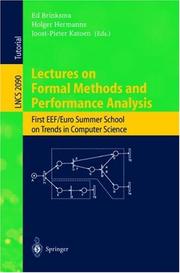
ISSN: 03029743 ISBN: 3540424792 3540446672 9783540424796 Year: 2001 Volume: 2090 Publisher: Berlin, Heidelberg : Springer Berlin Heidelberg : Imprint: Springer,
Abstract | Keywords | Export | Availability | Bookmark
 Loading...
Loading...Choose an application
- Reference Manager
- EndNote
- RefWorks (Direct export to RefWorks)
Traditionally, models and methods for the analysis of the functional correctness of reactive systems, and those for the analysis of their performance (and - pendability) aspects, have been studied by di?erent research communities. This has resulted in the development of successful, but distinct and largely unrelated modeling and analysis techniques for both domains. In many modern systems, however, the di?erence between their functional features and their performance properties has become blurred, as relevant functionalities become inextricably linked to performance aspects, e.g. isochronous data transfer for live video tra- mission. During the last decade, this trend has motivated an increased interest in c- bining insights and results from the ?eld of formal methods – traditionally - cused on functionality – with techniques for performance modeling and analysis. Prominent examples of this cross-fertilization are extensions of process algebra and Petri nets that allow for the automatic generation of performance models, the use of formal proof techniques to assess the correctness of randomized - gorithms, and extensions of model checking techniques to analyze performance requirements automatically. We believe that these developments markthe - ginning of a new paradigm for the modeling and analysis of systems in which qualitative and quantitative aspects are studied from an integrated perspective. We are convinced that the further worktowards the realization of this goal will be a growing source of inspiration and progress for both communities.
Formal methods (Computer science) --- Computer Science --- Engineering & Applied Sciences --- Méthodes formelles (Informatique) --- Congresses --- Congrès --- Méthodes formelles (Informatique) --- Congrès --- Computer science. --- Computer communication systems. --- Computer system failures. --- Software engineering. --- Computer logic. --- Computer engineering. --- Computer Science. --- Software Engineering/Programming and Operating Systems. --- Computer Engineering. --- Logics and Meanings of Programs. --- Software Engineering. --- System Performance and Evaluation. --- Computer Communication Networks. --- Logic design. --- Computer system performance. --- Computer software engineering --- Engineering --- Design, Logic --- Design of logic systems --- Digital electronics --- Electronic circuit design --- Logic circuits --- Machine theory --- Switching theory --- Communication systems, Computer --- Computer communication systems --- Data networks, Computer --- ECNs (Electronic communication networks) --- Electronic communication networks --- Networks, Computer --- Teleprocessing networks --- Data transmission systems --- Digital communications --- Electronic systems --- Information networks --- Telecommunication --- Cyberinfrastructure --- Electronic data processing --- Network computers --- Computer failures --- Computer malfunctions --- Computer systems --- Failure of computer systems --- System failures (Engineering) --- Fault-tolerant computing --- Computer science logic --- Logic, Symbolic and mathematical --- Computers --- Distributed processing --- Failures --- Design and construction --- Formal methods (Computer science) - Congresses
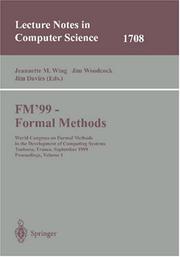
ISBN: 3540665870 3540665889 3540481192 3540481184 9783540665878 9783540665885 Year: 1999 Volume: 1708 Publisher: Berlin, Germany ; New York, New York : Springer,
Abstract | Keywords | Export | Availability | Bookmark
 Loading...
Loading...Choose an application
- Reference Manager
- EndNote
- RefWorks (Direct export to RefWorks)
Formal methods are coming of age. Mathematical techniques and tools are now regarded as an important part of the development process in a wide range of industrial and governmental organisations. A transfer of technology into the mainstream of systems development is slowly, but surely, taking place. FM’99, the First World Congress on Formal Methods in the Development of Computing Systems, is a result, and a measure, of this new-found maturity. It brings an impressive array of industrial and applications-oriented papers that show how formal methods have been used to tackle real problems. These proceedings are a record of the technical symposium ofFM’99:alo- side the papers describingapplicationsofformalmethods,youwill ndtechnical reports,papers,andabstracts detailing new advances in formaltechniques,from mathematical foundations to practical tools. The World Congress is the successor to the four Formal Methods Europe Symposia, which in turn succeeded the four VDM Europe Symposia. This s- cession re?ects an increasing openness within the international community of researchers and practitioners: papers were submitted covering a wide variety of formal methods and application areas. The programmecommittee re?ects the Congress’s international nature, with a membership of 84 leading researchersfrom 38 di erent countries.The comm- tee was divided into 19 tracks, each with its own chair to oversee the reviewing process. Our collective task was a di cult one: there were 259 high-quality s- missions from 35 di erent countries.
Formal methods (Computer science) --- Application software --- Méthodes formelles (Informatique) --- Logiciels d'application --- Congresses --- Development --- Congrès --- Développement --- Computer Science --- Engineering & Applied Sciences --- Software engineering --- Méthodes formelles (Informatique) --- Congrès --- Développement --- Computer science. --- Special purpose computers. --- Software engineering. --- Programming languages (Electronic computers). --- Computers. --- Computer logic. --- Computer Science. --- Theory of Computation. --- Software Engineering/Programming and Operating Systems. --- Logics and Meanings of Programs. --- Software Engineering. --- Programming Languages, Compilers, Interpreters. --- Special Purpose and Application-Based Systems. --- Information theory. --- Logic design. --- Informatics --- Science --- Design, Logic --- Design of logic systems --- Digital electronics --- Electronic circuit design --- Logic circuits --- Machine theory --- Switching theory --- Computer software engineering --- Engineering --- Communication theory --- Communication --- Cybernetics --- Special purpose computers --- Computers --- Computer languages --- Computer program languages --- Computer programming languages --- Machine language --- Electronic data processing --- Languages, Artificial --- Computer science logic --- Logic, Symbolic and mathematical --- Automatic computers --- Automatic data processors --- Computer hardware --- Computing machines (Computers) --- Electronic brains --- Electronic calculating-machines --- Electronic computers --- Hardware, Computer --- Computer systems --- Calculators --- Cyberspace --- Formal methods (Computer science) - Congresses --- Application software - Development - Congresses --- Congresses.
| Listing 1 - 10 of 44 | << page >> |
Sort by
|

 Search
Search Feedback
Feedback About UniCat
About UniCat  Help
Help News
News